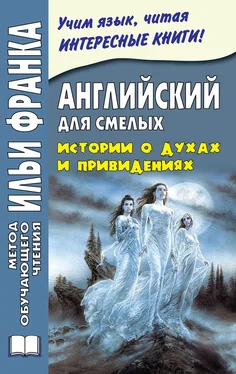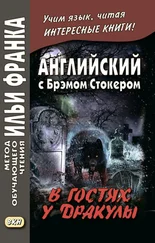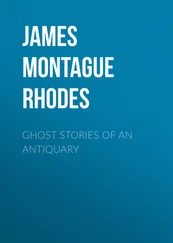
 No, I did not die of fright: the Thing turned and went away. I heard it go down the stairs, hurriedly, I thought, as if itself in sudden fear. Then I rose to call for help. Hardly had my shaking hand found the doorknob when – merciful heaven! – I heard it returning. Its footfalls as it remounted the stairs were rapid, heavy and loud; they shook the house. I fled to an angle of the wall and crouched upon the floor. I tried to pray. I tried to call the name of my dear husband. Then I heard the door thrown open. There was an interval of unconsciousness, and when I revived I felt a strangling clutch upon my throat – felt my arms feebly beating against something that bore me backward – felt my tongue thrusting itself from between my teeth! And then I passed into this life.
No, I did not die of fright: the Thing turned and went away. I heard it go down the stairs, hurriedly, I thought, as if itself in sudden fear. Then I rose to call for help. Hardly had my shaking hand found the doorknob when – merciful heaven! – I heard it returning. Its footfalls as it remounted the stairs were rapid, heavy and loud; they shook the house. I fled to an angle of the wall and crouched upon the floor. I tried to pray. I tried to call the name of my dear husband. Then I heard the door thrown open. There was an interval of unconsciousness, and when I revived I felt a strangling clutch upon my throat – felt my arms feebly beating against something that bore me backward – felt my tongue thrusting itself from between my teeth! And then I passed into this life.
No, I have no knowledge of what it was(нет, я не знаю: «не имею знания», что это было) . The sum of what we knew at death(совокупность: «сумма» наших знаний в момент смерти; to know ) is the measure of what we know afterward of all that went before(это мера того, что мы знаем потом обо всем, что происходило раньше) . Of this existence we know many things(об этом существовании мы знаем многое) , but no new light falls upon any page of that(но новый свет не проливается ни на одну страницу прежнего существования) ; in memory is written all of it that we can read(все, что мы можем прочитать, заключено в памяти; to write – писать ) . Here are no heights of truth overlooking the confused landscape of that dubitable domain(нет здесь вершин истины, чтобы обозреть хаотичный пейзаж нашей прошлой жизни: «тех сомнительных мест»; height – высота, вышина; верхушка, вершина; domain – наследственная собственность; имение, поместье; территория, зона, область; dubitable = dudable – сомнительный, вызывающий сомнения; / лат. / dubitare – сомневаться ) . We still dwell in the Valley of the Shadow(мы по-прежнему обитаем в этой долине теней) , lurk in its desolate places(затаившись в ее уединенных уголках; desolate – одинокий, оставленный всеми, заброшенный ) , peering from brambles and thickets at its mad, malign inhabitants(из чащобы и бурелома поглядывая на ее сумасшедших злобных обитателей; to peer – зд.: вглядываться; изучать; bramble – ежевика; thicket – чаща; заросли ) . How should we have new knowledge of that fading past(откуда нам узнать что-то новое об этом ускользающем прошлом; knowledge – знание; to fade – постепенно исчезать, расплываться, блекнуть, тускнеть )?
What I am about to relate happened on a night(то, о чем я собираюсь рассказать, случилось ночью) . We know when it is night(мы знаем, когда приходит ночь) , for then you retire to your houses(ибо вы тогда прячетесь по домам; to retire – уходить, удаляться, возвращаться на обычное место ) and we can venture from our places of concealment to move unafraid about our old homes(и мы тогда можем осмелиться выйти из своих тайников: «мест укрытия», чтобы без боязни скитаться среди прежних наших домов; to venture – отважиться, осмелиться; to move – двигаться, перемещаться ) , to look in at the windows(заглядывать в окна) , even to enter and gaze upon your faces as you sleep(даже заходить, чтобы посмотреть на ваши лица, когда вы спите; to gaze – пристально глядеть; вглядываться; уставиться ) . I had lingered long near the dwelling where I had been so cruelly changed to what I am(я долго оставалась поблизости от того дома, где меня так беспощадно обратили в то, чем я являюсь сейчас; to linger – задерживаться ) , as we do while any that we love or hate remain(так случается: «так мы делаем», пока есть кто-то, кого мы любим или ненавидим; to remain – оставаться ) . Vainly I had sought some method of manifestation(тщетно я искала какой-нибудь метод проявить себя; to seek; manifestation – проявление ) , some way to make my continued existence and my great love and poignant pity understood by my husband and son(какой-нибудь способ дать понять моим мужу и сыну, что я все еще существую, по-прежнему очень их люблю и жалею: «какой-то способ сделать мое продолжающееся существование и мою большую любовь и пронзительную жалость понятыми моими мужем и сыном»; poignant – трогательный, берущий за душу ) . Always if they slept they would wake(всегда, если они спали, они пробуждались) , or if in my desperation I dared approach them when they were awake(или, если в отчаянии своем я осмеливалась приблизиться к ним, когда они бодрствовали) , would turn toward me the terrible eyes of the living(обращали ко мне эти ужасные глаза живущих) , frightening me by the glances that I sought from the purpose that I held(/и/ взглядами, что я жаждала увидеть: «искала» отпугивая меня от цели, которую я перед собой ставила; to hold – держать ).

 No, I have no knowledge of what it was. The sum of what we knew at death is the measure of what we know afterward of all that went before. Of this existence we know many things, but no new light falls upon any page of that; in memory is written all of it that we can read. Here are no heights of truth overlooking the confused landscape of that dubitable domain. We still dwell in the Valley of the Shadow, lurk in its desolate places, peering from brambles and thickets at its mad, malign inhabitants. How should we have new knowledge of that fading past?
No, I have no knowledge of what it was. The sum of what we knew at death is the measure of what we know afterward of all that went before. Of this existence we know many things, but no new light falls upon any page of that; in memory is written all of it that we can read. Here are no heights of truth overlooking the confused landscape of that dubitable domain. We still dwell in the Valley of the Shadow, lurk in its desolate places, peering from brambles and thickets at its mad, malign inhabitants. How should we have new knowledge of that fading past?
Читать дальше
Конец ознакомительного отрывка
Купить книгу


 No, I did not die of fright: the Thing turned and went away. I heard it go down the stairs, hurriedly, I thought, as if itself in sudden fear. Then I rose to call for help. Hardly had my shaking hand found the doorknob when – merciful heaven! – I heard it returning. Its footfalls as it remounted the stairs were rapid, heavy and loud; they shook the house. I fled to an angle of the wall and crouched upon the floor. I tried to pray. I tried to call the name of my dear husband. Then I heard the door thrown open. There was an interval of unconsciousness, and when I revived I felt a strangling clutch upon my throat – felt my arms feebly beating against something that bore me backward – felt my tongue thrusting itself from between my teeth! And then I passed into this life.
No, I did not die of fright: the Thing turned and went away. I heard it go down the stairs, hurriedly, I thought, as if itself in sudden fear. Then I rose to call for help. Hardly had my shaking hand found the doorknob when – merciful heaven! – I heard it returning. Its footfalls as it remounted the stairs were rapid, heavy and loud; they shook the house. I fled to an angle of the wall and crouched upon the floor. I tried to pray. I tried to call the name of my dear husband. Then I heard the door thrown open. There was an interval of unconsciousness, and when I revived I felt a strangling clutch upon my throat – felt my arms feebly beating against something that bore me backward – felt my tongue thrusting itself from between my teeth! And then I passed into this life.










